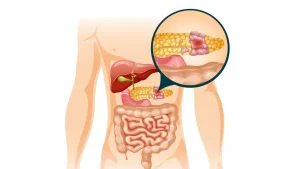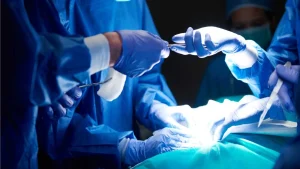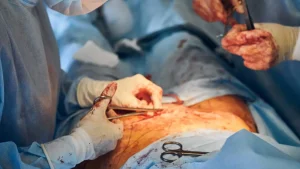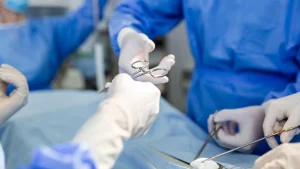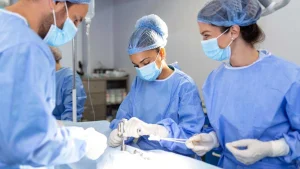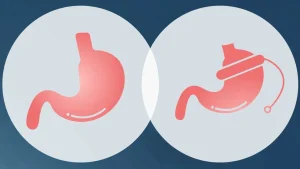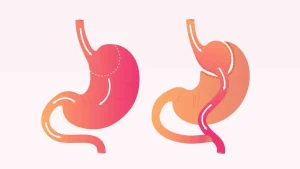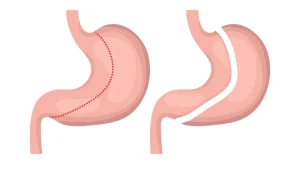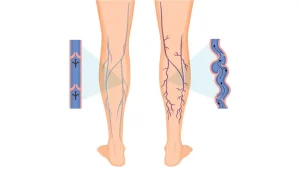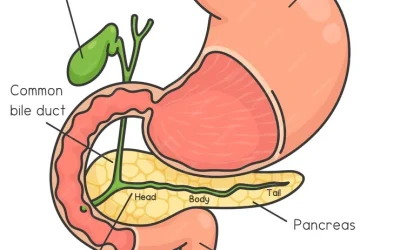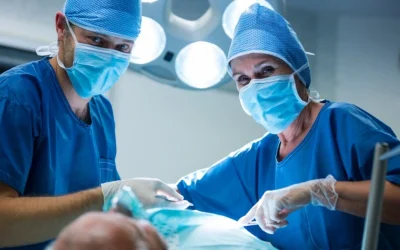Gastric Sleeve Surgery

Overview
Gastric sleeve surgery, an effective and popular procedure for achieving significant weight loss and improving overall health. Also known as sleeve gastrectomy, gastric sleeve surgery involves removing a portion of the stomach to create a smaller, sleeve-shaped stomach that helps patients feel full more quickly and eat less.
This procedure is often recommended for individuals who have been unable to achieve their weight loss goals through diet and exercise alone, and who may be experiencing serious health problems as a result of their obesity.
Our team of experienced bariatric surgeons specializes in performing gastric sleeve surgery and provides personalized treatment plans tailored to meet each patient’s unique needs and goals.
We are committed to providing the highest quality care and support throughout the entire process, from pre-operative evaluation to post-operative recovery and long-term follow-up.
If you’re considering gastric sleeve surgery as a solution to your weight loss struggles, you have come to the right place. Learn more about how this procedure can help you achieve your goals and improve your overall health and wellbeing.
Everything You Need To Know Gastric Sleeve Surgery
What is Gastric Sleeve Surgery
Gastric sleeve surgery is a restrictive weight loss procedure. During the operation, your surgeon will remove around 75% of your stomach, leaving you with a banana-shaped pouch, or “sleeve” that holds significantly fewer calories in comparison to a regular stomach.
This smaller stomach size limits how much food you can eat at once, helping you feel full faster and consume fewer calories each day. As a result of this restriction, most patients experience rapid and substantial weight loss within just weeks or months after their surgery.
What Are The Benefits?
The primary benefit of gastric sleeve surgery is significant weight loss and improved overall health for individuals who have been unable to achieve their goals through diet and exercise alone. Other potential benefits include:
- Reduced risk of chronic diseases associated with obesity, such as type 2 diabetes and high blood pressure
- Improved metabolic health and reduced cholesterol levels
- Increased energy levels
- Improved quality of life
- Long-term weight loss maintenance
We understand that undergoing any type of surgical procedure can be stressful and overwhelming. That’s why we strive to make sure each patient has the best possible experience from pre-operative evaluation through post-operative recovery.
When is Gastric Sleeve Surgery Recommended?
Gastric sleeve surgery may be recommended for individuals who meet the following criteria:
- BMI over 40 or BMI over 35 with serious, obesity-related health conditions
- Unsuccessful weight management through diet and exercise alone
- Ability to commit to a long-term lifestyle changes that include eating healthy foods and regular physical activity
- No prior history of alcohol abuse or drug addiction
- Aged 18 years old and above.
If you think you may be a candidate for gastric sleeve surgery, we encourage you to contact a bariatric surgeon for additional information and clarity on the matter.
Gastric Sleeve Surgery – When Is It the Preferred Option?
When considering gastric sleeve surgery vs. other bariatric surgeries, prospective patients should consider a variety of factors like risks, recovery time, cost, and more. Ultimately, there is no one-size-fits-all approach to bariatric surgery; rather it’s important to consult with your doctor to determine which option will best meet your medical needs.
Some situations where gastric sleeve might be preferred include:
- If you have an elevated body mass index (BMI) but do not suffer from diabetes or sleep apnea.
- If you have a wide range of food sensitivities or allergies that prevents you from following diet plans prescribed by doctors or nutritionists.
- If you are already confident about making lifestyle changes required for successful weight management after undergoing surgery.
- If minimally invasive techniques are desired to reduce potential risks and expenses associated with other types of bariatric procedures.
Ultimately, gastric sleeve surgery should be viewed as part of a comprehensive plan towards healthy living rather than an instantaneous fix for obesity problems. Patients are strongly encouraged to take advantage of counselors and support groups both before and after their procedure to maximize their chances for successful results in terms of weight management as well as overall health and wellness goals!
Pre-Operative Evaluation: What to Expect Before Gastric Sleeve Surgery
If you are considering gastric sleeve surgery, it is important to understand the pre-operative evaluation process and what tests and evaluations you will need to undergo before undergoing the procedure.
The first step in any pre-operative evaluation for gastric sleeve surgery is a comprehensive physical examination by your surgeon. Your surgeon will assess your overall health and determine whether you are a good candidate for bariatric surgery. During your physical exam, they may take measurements such as height, weight, and Body Mass Index (BMI).
In addition to a physical exam, there are several tests that must be completed prior to having gastric sleeve surgery. These can include blood work, an electrocardiogram (ECG), urine analysis, X-rays or CT scans of internal organs and structures, mental health screening tests (such as depression screening), and other assessments that may be necessary depending on your specific circumstances.
Your surgeon will review all of the test results in order to make sure that you are physically healthy enough to proceed with the procedure. If there are any issues or concerns about your health status or whether bariatric surgery is appropriate for your individual needs, this can be discussed during follow-up meetings prior to scheduling any type of surgery.
It’s also important to note that insurance plans vary when it comes to their coverage for gastric sleeve surgery. Be sure to check with your provider prior to undergoing any pre-operative evaluations or tests in order to confirm if these exams will be covered under your plan or not.
The pre-operative evaluation process is an important part of preparing for gastric sleeve surgery; these assessment steps ensure that you have a full understanding of both the medical requirements as well as potential risks associated with the procedure before going ahead with it.
The Procedure: Understanding Gastric Sleeve Surgery
The gastric sleeve procedure usually begins with general anesthesia, followed by the insertion of a laparoscope (a thin, lighted tube) into several small incisions made in the abdomen. This allows surgeons to view inside the body and perform the surgery without creating large wounds. During the surgical process, your surgeon will remove up to 80% of your stomach, resulting in a much smaller pouch that can only hold a fraction of your original stomach’s capacity.
In most cases, patients wake up shortly after gastric sleeve surgery feeling alert and awake—however this varies from person to person depending on several factors such as age and pre-existing medical conditions. Most patients are able to go home within 1–2 days after their procedure or may remain hospitalized for longer periods if needed for their particular circumstances.
Recovery time for this type of weight loss surgery depends on individual factors such as overall health, age, and other existing medical conditions; however it typically takes between 4–6 weeks before full recovery is expected. Many individuals find that they are able to incorporate light exercise into their routine soon after the operation — following their doctor’s instructions — which can help with healing while also providing additional psychological benefits.
Gastric sleeve surgery is generally considered safe when done by experienced surgeons who specialize in bariatric surgeries — however there are certain risks associated with any type of operation that should be discussed with your doctor prior to choosing this option as a method for weight loss management.
Post-Operative Recovery: What to Expect After Gastric Sleeve Surgery
Gastric sleeve surgery is a major procedure and requires time to heal properly. Here is an overview of what you can expect during your post-operative recovery.
Immediately following the surgery, patients typically experience some pain and discomfort that can be managed with medication, as well as a sore throat and difficulty swallowing. Swelling in the abdomen is also common, but should subside within a few days. There may also be feelings of nausea and vomiting which are typically alleviated by medications prescribed by your surgeon after the surgery.
It’s important to rest as much as possible directly following the procedure. During this initial period of recovery it is recommended that you avoid lifting any heavy objects or driving for at least 2–3 weeks. Your surgeon will provide specific instructions on how long to wait before returning to activities such as strenuous exercise or sports, however generally speaking it’s best to avoid strenuous activities for up to 6–8 weeks after gastric sleeve surgery in order for your body to heal properly.
The diet restrictions immediately following gastric sleeve surgery can vary from patient to patient depending on their individual circumstances; however in general it’s recommended that you begin with clear liquids — such as water or broth — for at least two weeks after the operation and slowly progress onto solid foods over the course of several weeks. Your doctor will provide detailed instructions regarding when and how much food can be consumed during post-operative recovery; it’s important that you stick to these guidelines in order to prevent complications such as nausea or vomiting due to overeating
In addition, lifestyle changes associated with weight loss management will need to be adopted during post-operative care; these include things such as tracking food intake, increasing physical activity levels, drinking more water, getting more sleep, and avoiding sugary beverages & snacks that could lead to weight gain. It’s also important that you practice mindful eating habits so that you don’t eat too quickly or become overwhelmed by large portions of food.
Post-operative recovery from gastric sleeve surgery takes time and dedication; however if done correctly patients should expect successful long-term outcomes in terms of sustained weight loss!
Long-Term Results: Understanding Gastric Sleeve Surgery Outcomes
Gastric sleeve surgery is a proven method for achieving sustained weight loss and maintaining a healthy lifestyle. On average, most individuals experience between 40–60% of total body weight loss over the course of 2–3 years after the procedure.
In addition to the initial weight loss, gastric sleeve surgery also produces positive results in terms of improved health outcomes. Many individuals find that pre-existing medical conditions — such as diabetes, high blood pressure, and sleep apnea — are substantially reduced or even resolved entirely due to their successful implementation of a healthy diet & exercise routine following the surgery.
Despite these long-term benefits, there are certain risks associated with this type of procedure that must be taken into consideration before proceeding. These include nausea & vomiting due to overeating, an increased risk of intestinal obstructions due to partial stomach removal, and potential nutritional deficiencies due to poor dietary habits; it’s therefore important to discuss any concerns or possible complications with your doctor prior to choosing gastric sleeve surgery as an option for weight loss management.
Overall, gastric sleeve surgery can have positive long-term outcomes if carefully monitored and diligently followed by dedicated patients who are willing to make the necessary lifestyle changes for successful weight loss management. It is important that you understand all aspects of this procedure before making any decisions regarding choosing this type of operation!
FAQs: Key Information on Gastric Sleeve Surgery
Gastric sleeve surgery is a major operation and it’s important to understand all aspects of the procedure before making any decisions. Here are some common questions and answers that may be helpful in providing insight into what you can expect after the surgery:
-
How long do I have to stay in the hospital after gastric sleeve surgery?
Most patients typically stay in the hospital for between 2-4 days, however this will vary depending on individual circumstances. Your doctor will provide detailed instructions regarding how long you should stay in the hospital after your operation.
-
Will I have to take vitamin and mineral supplements after gastric sleeve surgery?
Yes, it is recommended that patients take multivitamin supplements for 1–3 months following gastric sleeve surgery in order to prevent nutritional deficiencies. It’s important to discuss these recommendations with your doctor prior to the procedure so that you can plan accordingly.
-
Is gastric sleeve surgery reversible?
No, since much of the stomach tissue is removed during this type of procedure it cannot be reversed. However, there are other surgical options available if you decide later down the line that this type of procedure isn’t right for you.
-
Will I need to change my diet after the gastric sleeve surgery?
Yes, as part of post-operative care it’s necessary to adhere to a strict low-calorie diet which includes 6–8 ounces of water daily, 4–6 small meals throughout the day, avoiding sugary snacks & beverages, and not overeating or eating too quickly. It’s important that you follow these guidelines carefully in order for successful weight loss management over time!
-
How much weight can I expect to lose after the gastric sleeve surgery?
On average most individuals experience between 40–60% of total body weight loss over the course of 2–3 years after undergoing gastric sleeve surgery; however this number can vary from person to person depending on their individual circumstances.
Why choose Dr Ankit Potdar for gastric sleeve surgery?
Dr. Ankit Potdar is a highly experienced surgeon specializing in gastric sleeve surgery and other bariatric procedures. He has extensive experience performing the surgery and has successfully achieved long-term success for his patients over the years.
When choosing to have gastric sleeve surgery, it’s important to work with an experienced doctor who understands your individual needs and can provide the best possible care. Dr. Potdar is dedicated to helping his patients achieve success through personalized treatment plans that take into account their medical history, lifestyle, diet, and goals.
At his practice, he has implemented a comprehensive approach that includes pre-operative counseling, dietary guidance throughout the recovery process, regular follow-up appointments to ensure successful outcomes, as well as careful monitoring of post-surgery progress & results. This ensures that each patient receives the most comprehensive care possible when undergoing such an important procedure.
Dr. Ankit Potdar’s experience in gastric sleeve surgery makes him an ideal choice for those looking for successful long-term results from this type of procedure!
For more information, contact us today to schedule a personalized consultation with Dr. Potdar. With his expertise, you can be sure that you are in good hands when it comes to undergoing gastric sleeve surgery.
We look forward to speaking with you and helping you achieve your goals!
Our Services
Pancreatic Cancer
Pancreatic cancer is a type of cancer that affects the pancreas – an organ located in the abdomen
Colon Cancer / Colorectal Cancer Surgery
Colon cancer is a serious and potentially life-threatening disease.
Hernia Laparoscopic Surgery
A hernia is the protrusion of an organ or tissue through a weak or damaged area in the abdominal wall
Piles Surgery
Piles, also known as hemorrhoids, are swollen veins in the anal and rectal area.
Appendix Surgery
Pain or discomfort in your abdomen, it is possible that you may have appendicitis.
Fistula Surgery
A fistula is an abnormal connection between two organs or tissues that can lead to complications.
Gallstone Surgery
Gallstone Surgery is a minimally invasive procedure to remove gallstones.
Gastric Band Surgery
Gastric Band Surgery is a safe, non-invasive bariatric procedure that helps you lose weight quickly and safely
Gastric Bypass Surgery
Gastric Bypass Surgery is a minimally invasive procedure that can help you to achieve your weight loss dreams.
Gastric Sleeve Surgery
Gastric sleeve surgery, an effective and popular procedure for achieving significant weight loss.
Varicose Veins
Varicose veins are enlarged, twisted and swollen veins that occur mainly in the lower legs and feet.

PROFILE
About Dr. Ankit Potdar
Dr. Ankit Potdar is one of the best laparoscopic surgeon in Mumbai, India. He has extensive knowledge and training in advanced laparoscopic and robotic surgery, and is known for his precision, expertise, and compassionate approach to patient care.
He is an expert in general, oncological, advanced laparoscopic GI surgery, Thoracic and Esophageal surgery. He is currently associated with SRV Hospital, Goregaon West and Chembur Mumbai.
He has extensive experience in performing minimally invasive surgeries for various conditions, including gastrointestinal diseases, obesity, hernias, and gallbladder problems.
Patient Treated By Dr. Ankit Potdar
People heavily rely on reviews from other patients when choosing a healthcare provider
Dr. Ankit has done my Brother Harnia Surgery. It went well and my brother recovered so fast. Really good Dr. .Explained every precautions and give full assistance in the follow-up as well.. Thank you Dr. Ankit
Best doctor i ever met. Friendly type nature, my umbilical hernia surgery was done by dr ankit poddar and always recving my calls reply by late nights also ...
Dr Ankit Potdar is a gem of a person. I have been operated for ovarian cancer under his care and we are very satisfied with the treatment received. Doctor is very honest and straightforward and also helped us with the treatment protocol post surgery.
Patient Knowledge Center -Blogs
Blogs
Symptoms of Gallbladder Stones ?
Dr. Ankit Potdar, a renowned gallbladder surgeon in Chembur, specializes in treating gallbladder stones. Learn about symptoms and treatme...
Advantages of Laparoscopic Surgery for Hernia Repair
Transforming Hernia Repair: Meet Dr. Ankit Potdar, Mumbai’s Laparoscopy Expert! Uncover the Benefits of Minimally Invasive Surgery ...
Effective Methods for Gallbladder Stone Relief
Gallbladder stones, also known as gallstones, are a common medical condition affecting millions worldwide. These hardened deposits can ca...

